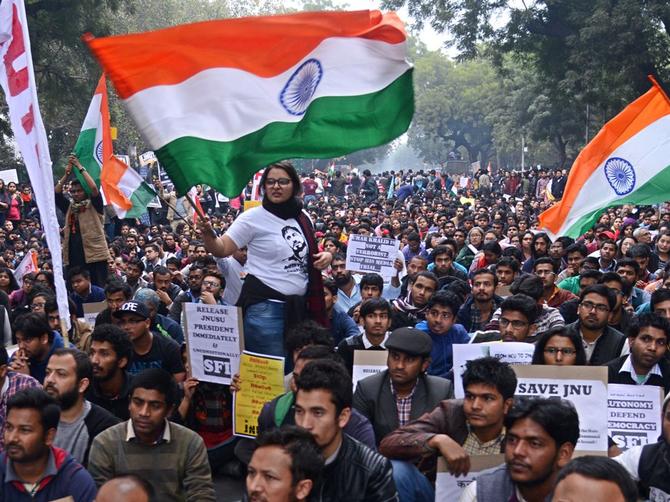To Argue Is To Be Indian
By Mohd Osama
24 February, 2016
Countercurrents.org

The hyper-nationalists like RSS and other similar organizations magisterially pronounce someone anti-national just because they are uncomfortable in debating and discussing things.
One might feel appalled on seeing recent developments regarding the (man)handling of the case concerning JNUSU president, Kanhaiya kumar. The narratives building on both sides are many. The debates on the news channels, where panelists scream to convince others about their version of nationalism and rashtrabhakti, are also so many. The vanguards of nationalism like RSS have an easy formula to judge somebody’s nationalist credentials, which is, either you are with us or against us. They and other parties belonging to the right political spectrum convinced people that the most anti-national and gruesome thing to do today, in the matter which concerns them, is to argue. To argue in the matter of nation and nationalism is next to crime of highest degree.
Is that true? Are they even partially correct, when they voice these opinions to kill the voices of people on the other side? Is being-argumentative and having a voice tantamount of being a criminal? Was charging a student with sedition law, administratively and politically correct decision? Can these self proclaimed ‘nationalists’ with their collective insight, judge any person a nationalist or anti-national?
The answer to all these pertinent questions is NO. I doubt this answer would convince our hyper-nationalists but let us try, by arguing, of course.
India has a long argumentative tradition starting right from vedic period. The ‘rockstars’ among argumentative Indians were early Buddhists. They had a great commitment to discussions as a means of social progress. This can be seen in the so-called ‘Buddhist councils’ which aimed at settling disputes between different points of view of people belonging to different schools of thought. This liberal argumentative tradition can also be seen in the conduct of the king Asoka’s dhamma, which wholeheartedly believed in conducting public discussion without violence or animosity. This king was a devout Buddhist follower.
Deeply looking into history of philosophical ideas would reflect substantial amount of heterodoxy. Different schools of agnosticism and atheism flourished almost peacefully with different shades of Vedanta philosophy. The evidence of this comes into light when we read Madhvacharya’s sarvadarsansamgraha, in which besides Vedant philosophical discussions, we can also see counter-arguments of Charvaka, the famous intellectual combative school of thought.
These are some of the examples from the many schools of thought which defined rich intellectual ancient history of India. Similar examples can be found in medieval and modern India. People like Tagore, Phule, Bhagat singh and Ambedkar comes readily in mind whenever any issue exist of – to question or not to question?
The hyper-nationalists like RSS and other similar organizations magisterially pronounce someone anti-national just because they are uncomfortable in debating and discussing things. The RSS and their idea of India is devoid of the most important segment of our civilization which is the propensity to argue. This arguable quality only has taught us about God, mathematics, rasayan vigyan, astronomy, universe and other difficult paradigms. The democracy which is our core socio-political ideal also requires deliberation. After all, it is also famously articulated by James Buchanan that, ‘democracy is a government by discussion’.
Having stated about democracy and other important disciplines, one can only say that what is happening in recent times in general and in JNU’s case in particular, nothing real lies in those stupid arguments invoking nationalism. Questions should be asked, that students of JNU and of other universities were wrong when they raised questions regarding Afzal Guru’s hanging? Were they even near of being at the wrong side when they practiced their fundamental right to speech without inciting violence or hatred of any kind? Is the idea of India and its pristine democracy antithetical to questions raised on its theory and practice? Is being argumentative is at all so bad to leave it to hegemonical forces?
Obviously, historical antecedents negate all the above questions. Rather, a true national identity is not of monolithic nature but of ‘federal’ nature, to use Amartya Sen’s words, consist of mosaic of identities which together reflect the people aspirations. What else can be the definition of nationalism other than being defined as sum total of aspirations, which are actually the expectations which we have from our nation. Nonetheless, different definitions of nationalism can be deduced and ponder upon, but this will only be possible if we argue and counter-argue. The rah-e-aql (path of reason) should be adopted over fossilized traditions. And why not, we all wanted to be seen as patriotic Indian. Right?
Mohd Osama is a student in the Department of Political Science, Jamia Millia Islamia, New Delhi-110025. He can be contacted at [email protected]

